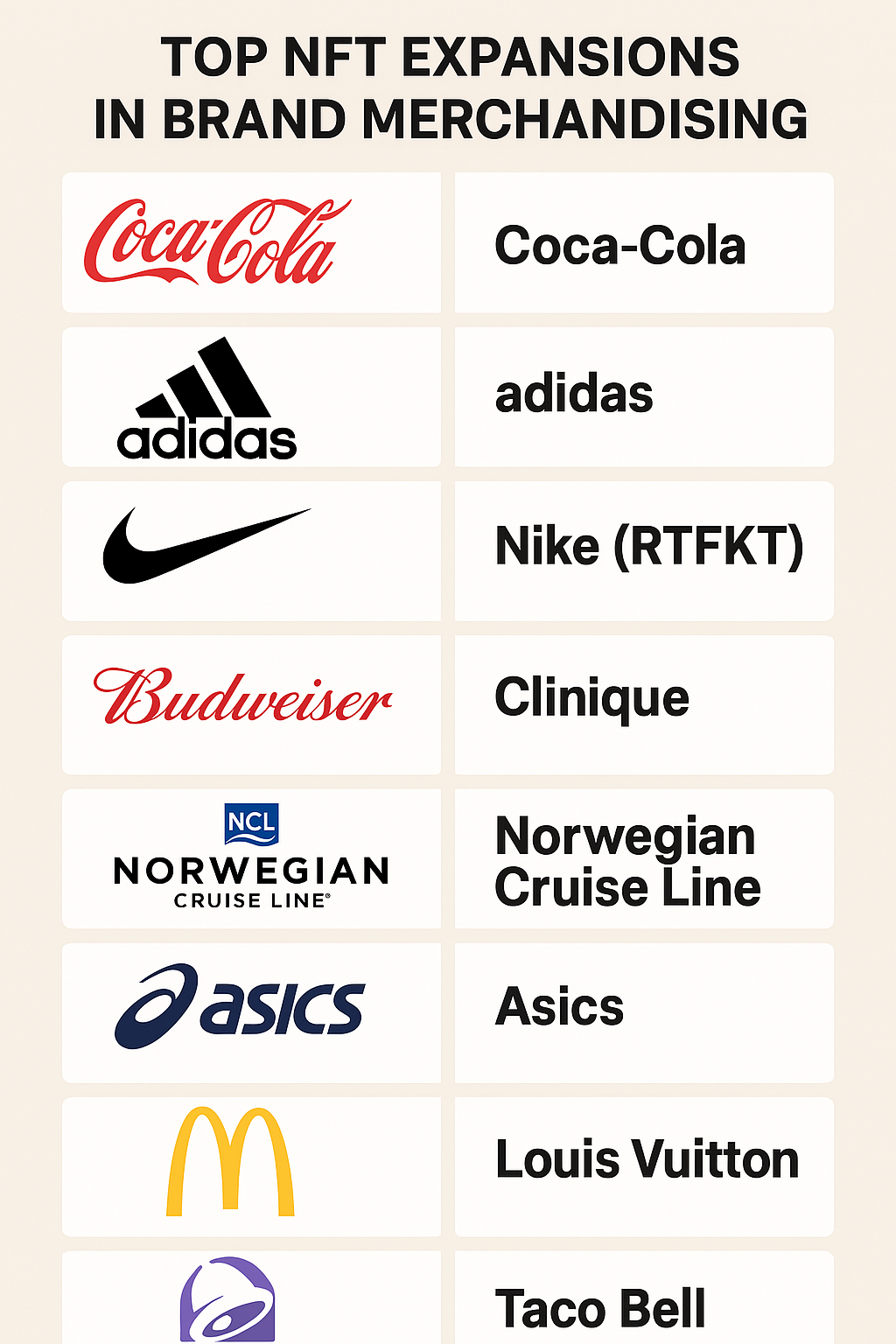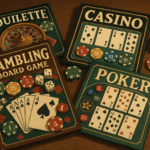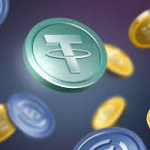In this article I will cover the Top NFT Expansions In Brand Merchandising. Global brands are already adopting NFTs to deepen customer interactions, offer exclusive digital items, and broaden their merchandising opportunities.
From Fashion to Food and Beverage, NFTs are changing the way brands engage with their customers by introducing hybrid offerings that integrate tangible items with virtual elements.
Key Point & Top NFT Expansions In Brand Merchandising
| Brand | Key Point |
|---|---|
| Coca-Cola | Known for iconic global marketing and consistent brand identity. |
| Adidas | Focuses on innovation and sustainability in athletic footwear and apparel. |
| Nike (RTFKT) | Invested in digital fashion and NFTs through its RTFKT acquisition. |
| Budweiser | Leverages sports partnerships to reinforce brand presence and loyalty. |
| Clinique | Dermatologist-developed skincare brand known for its allergy-tested products. |
| Norwegian Cruise Line | Offers freestyle cruising with flexible onboard experiences. |
| Asics | Emphasizes scientific research in developing performance-enhancing footwear. |
| McDonald’s | Pioneered fast-food franchising and global menu localization. |
| Louis Vuitton | Synonymous with luxury and craftsmanship in fashion and accessories. |
| Taco Bell | Known for bold, affordable Tex-Mex innovations and youth-oriented marketing. |
1. Coca Cola
Strategic branding, emotional marketing, and limited-edition merchandise are just some of the ways Coca-Cola has remained a leader in global beverages.
They made headlines in 2021 when collaborating with Tafi to create their first NFT collectibles, which featured animated digital wearables and branded loot boxes auctioned off for charity.
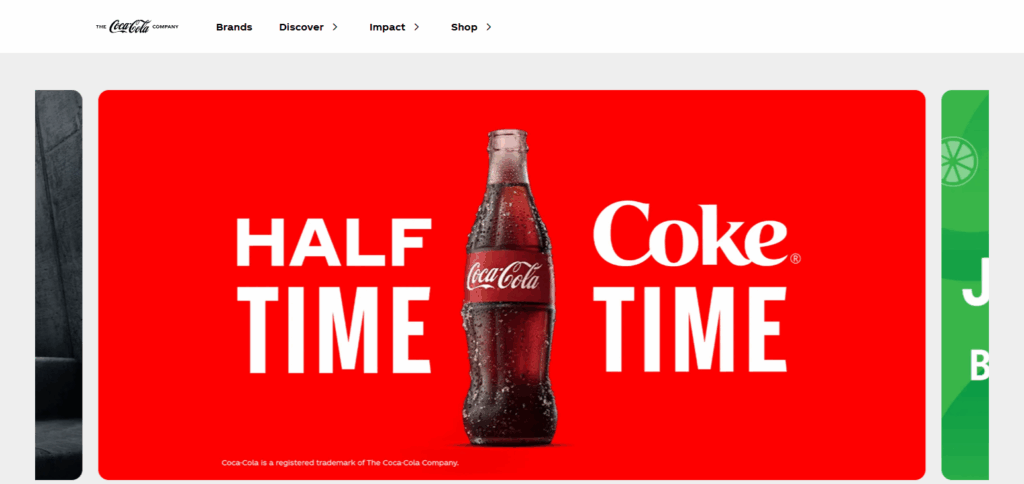
This leap into digital merchandising helped extend their nostalgic brand into the virtual realm. Coca-Cola emerges as an innovator for traditional brands that seek to tell a story with blockchain technology to engage younger audiences.
In addition, the brand is also engaging with virtual space through metaverse events, digital art, and partnership with Decentraland for immersive branded experiences.
Coca-Cola Features
- Use of digital art for emotional branding
- NFT items that can be worn and loot boxes for Virtual wearables
- Decentraland and other partnerships
2. Adidas
By stepping into the world of NFTs, Adidas has been able to blend digital innovation with their performance apparel and they continue pushing the boundaries of virtual worlds.
The brand created the “Into the Metaverse” project in collaboration with Bored Ape Yacht Club, Punks Comic and GMoney, which offered NFT holders access to digital and physical merch, and partnered with GMoney in 2021.
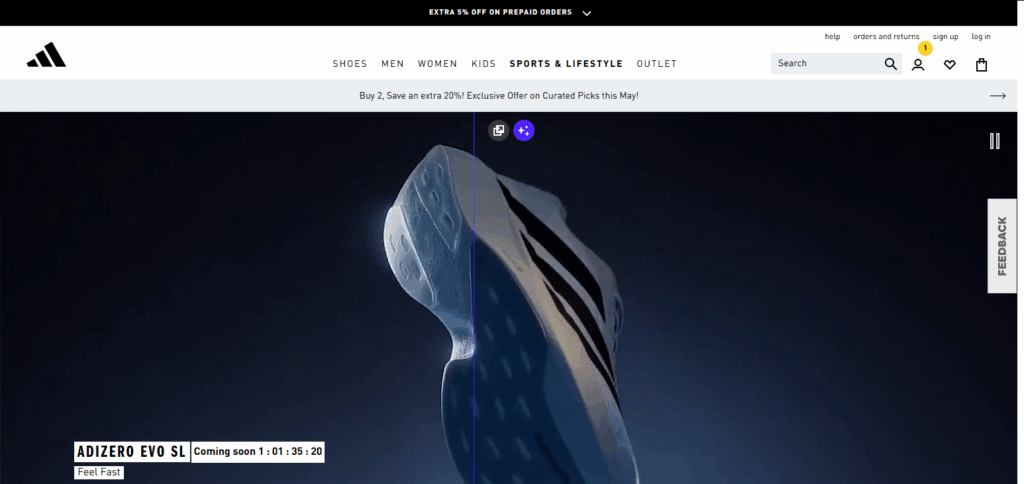
This was Adidas’s bold move towards the intersection of streetwear, fashion, and blockchain culture. Adidas has an NFT community strategy that has enabled the brand to offer exclusive immersive experiences and drops of limited-edition products.
Buzz among sneakerheads and crypto enthusiasts caused the drop to sell out within minutes, raising millions in the process.
Adidas has redefined their identity from a traditional retail vendor to a decentralized digital fashion house, active in web3 communities and next-gen consumers.
Adidas Features
- An NFT in the “Into the Metaverse” collection
- Deals with BAYC, Punks Comic, GMoney
- Merchandise comes in both tangible and intangible forms
3. Nike (RTFKT)
In 2021, Nike boldly stepped into the world of the NFT and metaverse by acquiring RTFKT Studios, specializing in virtual sneakers and digital collectibles. This purchase enabled Nike to lead in expanding the intersection of footwear and blockchain technology.
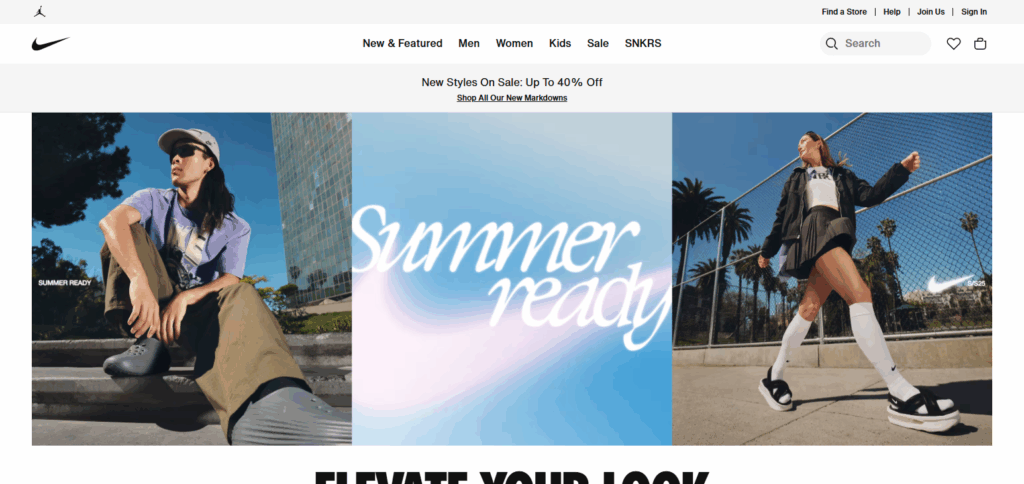
RTFKT’s CloneX NFTs and virtual sneaker releases are digitally regarded as some of the most important pieces of fashion and are frequently worn with physical goods. Nike’s and RTFKT’s partnership enables the athletic brand to transform sneaker culture by providing NFT holders with exclusive rights to highly coveted, limited edition physical and digital assets.
This strategy has unlocked new marketing and profit opportunities through Nike’s metaverse initiatives. Nike’s presence in Web3 branding domains makes the company a forerunner in advanced brand marketing, combining fashion, perishable goods, and technology to appeal to youth engrossed in digital worlds.
Nike (RTFKT) Features
- RTFKT Studios Acquisition
- Virtual Sneakers and CloneX avatars
- NFTs associated with physically limited released items
4. Budweiser
Budweiser has always been a leader in advertising and connecting with major sports and cultural events. In 2021, Budweiser launched the NFT (non-fungible token) craze with its beer NFTs called “Budverse Heritage Cans” which included 1936 distinct digital can designs.
As NFTs, they provided certain privileges such as additional exclusive merchandise, early access to events, and collectible drops. This initiative combined Budweiser’s culture of beer with a new interactive format, digital memorabilia, by engaging fans in a more rewarding way.
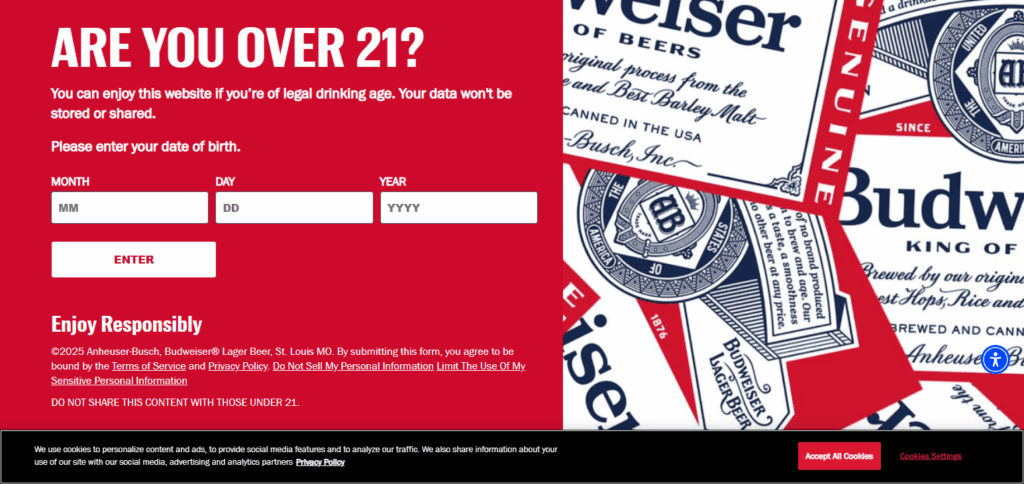
Moreover, the metaverse loyalty program targeted “Budverse” initiative aims to further expand into metaverse experiences and builds on the company’s existing metaverse plans.
This move into NFTs gave Budweiser an opportunity to expand its marketing and innovative merchandise, advancing into experiential marketing while remaining bold, young, and nostalgic.
Budweiser Features
- Budverse Heritage Can NFTs
- NFTs associated with physical goods and events
- Focus on sports and cultural branding
5. Clinique
A pioneer in skincare, Clinique leapt into the world of NFTs for customer engagement, rather than profit. The brand launched its initial NFT campaign in 2021 called “MetaOptimist,” where loyalty program members received limited edition NFTs and early access to exclusive product drops.
The goals of the campaign aligned with the brand’s ethos of confidence, self-expression, posh skincare, and empowering self-care. In contrast to other brands, Clinique did not sell their NFTs. Instead, NFTs were employed to strenthen connections, enjoy digital interactions, and foster loyalty.

This represents the monetizing principle where digital tokens are claimed to supplement physical beauty merchandise.
Clinique sought to understand how beauty in the context of web3 trends can be incorporated without speculation through the loyalty ecosystem powered by NFTs. The brand used the non-exploitative approach to underline its intention.
Clinique Features
- *MetaOptimist NFT campaign
- Costless NFTs to skincare loyalty program members
- Holistic, skincare digital branding focuses
6. Norwegian Cruise Line
Norwegian Cruise Line launched NFTs linked to travel in an innovative fashion. It released an NFT collection in 2022 to commemorate the launch of the Norwegian Prima ship.
The art was done by Manuel Di Rita (Peeta) and NFTs came with benefits such as cruise discounts and exclusive onboard participation. Such integration of NFTs into merchandising demonstrates a unique approach to digital collectibles in the travel world.
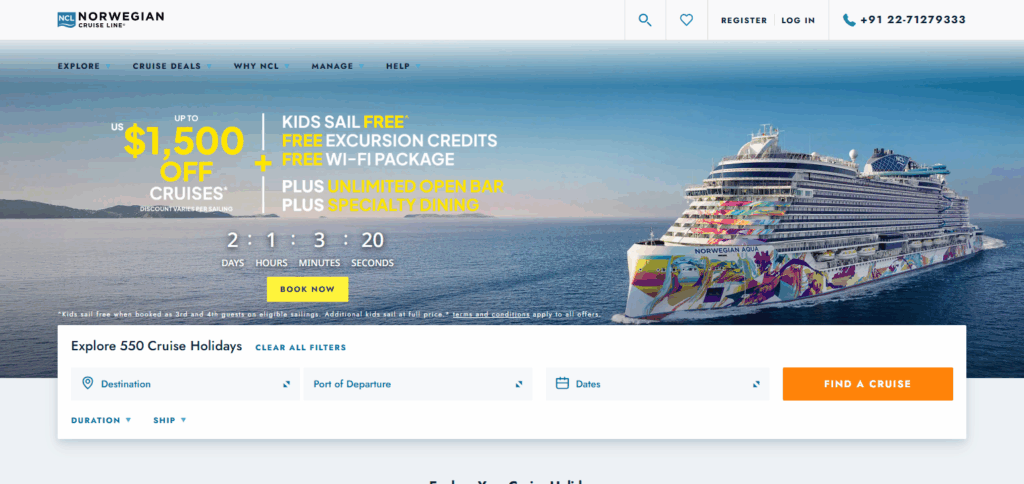
Norwegian’s move shows how NFTs can transcend being mere pieces of art and instead become portals to opulence.
This move also helps enhance brand image to appeal to younger travelers as well as digital asset collectors interested in utilizing verifiable assets, helping modernize cruise culture with Web3.
Norwegian Cruise Line Features
- NFTs for each new cruise ship launching
- Cruise perks include counterpart digital art NFTs
- Novel application in experiences and travel
7. Asics
Asics has put equal focus into scientific development as well as athletic innovation. The brand also forayed into the NFT space with the “Sunrise Red” collection in 2021, which aimed to encourage movement and positiveness through digital footwear.
These NFTs were sold on OpenSea and the revenue helped to support digital artists, as well as the Web3 community. This launch was not merely a collectible drop—but rather showed how Asics sought to integrate culture with fitness and blockchain technology.
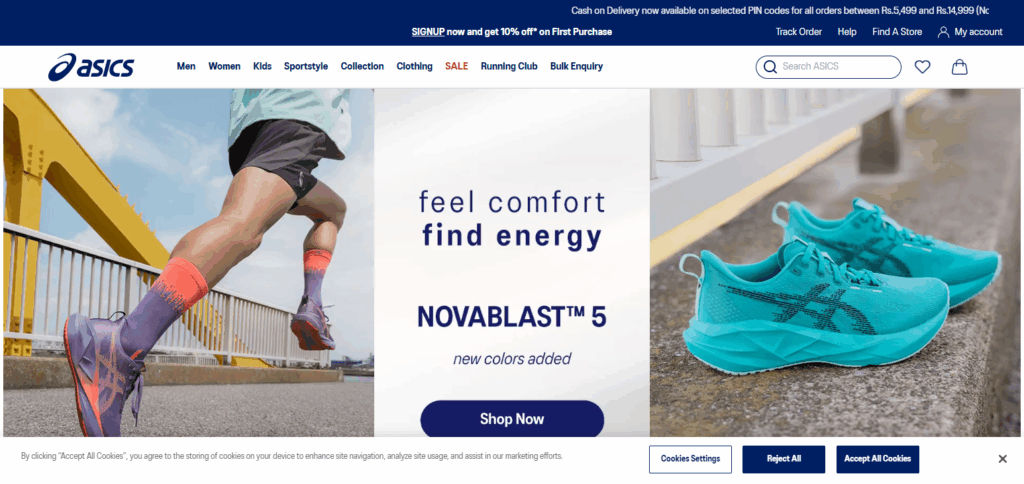
NFT holders were provided with exclusive content alongside upcoming physical product offers. Through such a social cause, Asics branded itself as a healthcare innovator that does not stray from its core values.
The initiative transformed their strategy to digital engagement by making merchandising more purposeful and creatively driven.
Asics Features
- Digital Sunrise Red shoe NFTs
- Revenues directed towards sponsoring artists
- Fitness focused NFT branding angle
8. McDonald’s
McDonald’s utilized NFTs to commemorate celebrations and enhance digital interaction. In 2021, it introduced its first NFT collection featuring the McRib sandwich to celebrate its return. Limited digital art pieces were distributed for free which generated excitement among fans for this staple menu item.
This campaign highlighted how McDonald’s blended nostalgia and modern technology to market their products. Although the NFTs were not sold, they served marketing purposes as digital assets and collectibles.
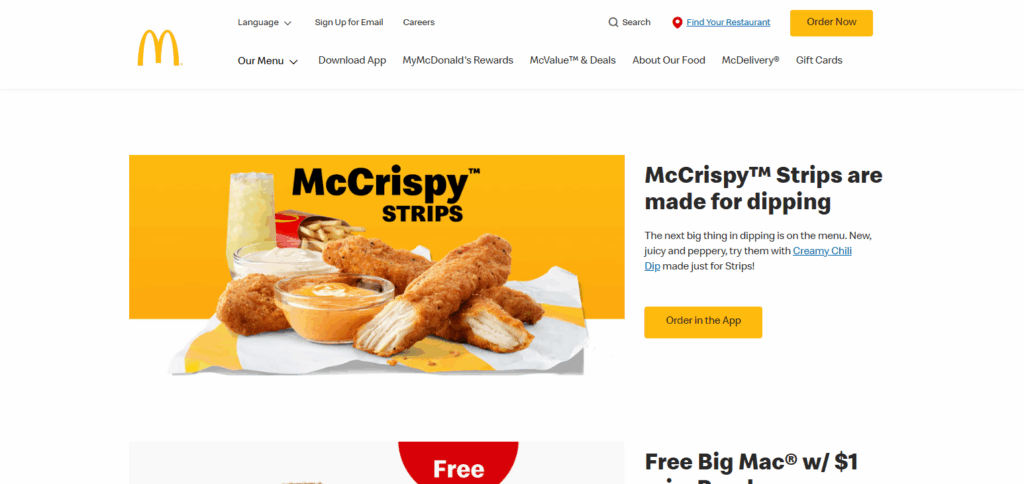
McDonald’s looked into virtual worlds through concepts of virtual restaurants and game-like interactions, indicating new opportunities for brand merchandising.
These attempts are consistent with the brand’s lighthearted persona while targeting younger audiences who are more inclined towards emerging technologies and prefer engaging activities and digital incentives.
McDonald’s Features
- Hollywood NFTs featuring their famous food icons
- NFTs as digital marketing artifacts
- Integration with virtual restaurant concepts
9. Louis Vuitton
As a luxury goods powerhouse, Louis Vuitton needs to meticulously protect and fortify its brand image. The immersion included within the mobile game “Louis: The Game” is no exception. With the help of Beeple, the Louis Vuitton 200 years anniversary NFTs make the game feel like more than just a marketing gimmick.
“NFTs” are no longer products sold, demonstrated by how Louis Vuitton places them in the narrative, but storytelling devices that elevate the brand’s rich heritage. NFTs in games tell a story, blending innovation and tradition together that resonates with consumers.
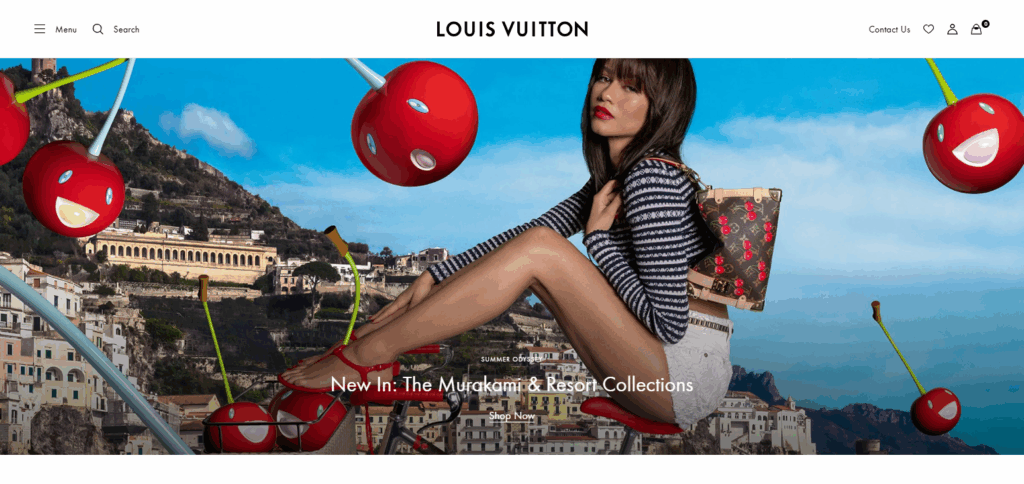
Louis Vuitton is a leading fashion technology provider and with their recent hints of using blockchain as a product authentication system, they will solidify that status. This shift in strategy does in fact bring further exclusivity as these NFTs transform into modern luxury collectibles for the digitally inclined while serving forward-thinking fashion enthusiasts.
Louis Vuitton Features
- “Louis: The Game” NFT-based app
- Beeple works together toward luxury digital artwork
- NFTs further underline brand history and heritage
10. Taco Bell
Taco Bell is recognized for its unique marketing as well as its promotional menu items, and NFTs were no different. In 2020, the brand released taco-themed NFTs on Rarible, and they quickly sold out. Each NFT sold came with a \$500 e-gift card, so archehighs of digital art were paired with tangible bonuses.
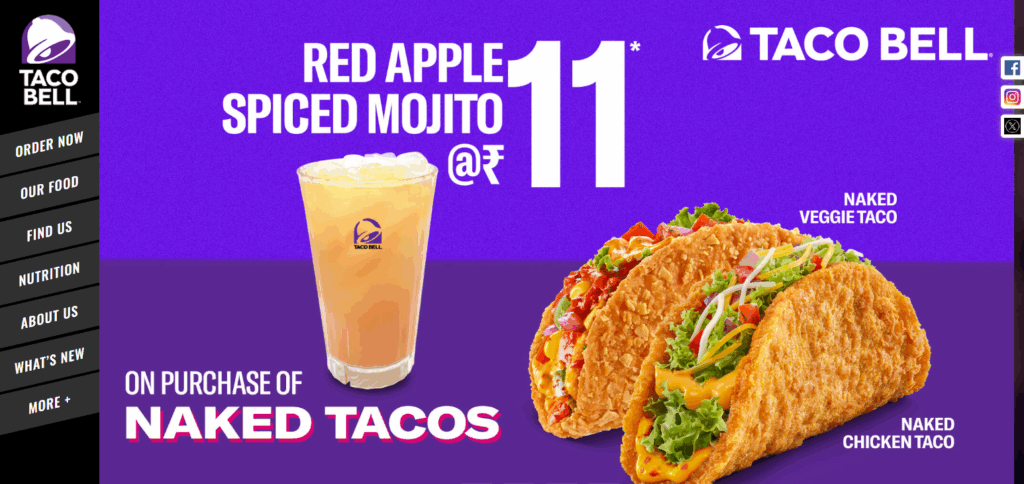
Taco Bell NFTs went viral, capturing the attention of fast-food brands looking for creative new ways to digitally merchandise their offerings. All proceeds went to the Taco Bell Foundation which added a charitable dimension to the marketing campaign.
With its culture marketing initiatives, the brand aimed to engage younger customers. In the process, Taco Bell cracked the code on marrying social impact, humor, and creativity in NFTs, branding in fast food.
Taco Bell Features
- Taco-themed NFTs with actual gift cards
- Sold out rapidly due to social media marketing
- Niche campaign focused on aiding charitable causes
Conclusion
NFT technology has been adopted by companies for marketing innovation, audience engagement, and merchandising enhancement. Nike’s RTFKT integration and Coca Cola’s NFT digital memorabilia are two examples of brands extending their identity through NFTs.
Digital assets provide guaranteed uniqueness that fosters brand loyalty, combines real life and digital experiences, and rewards devoted customers. Leading companies like Taco Bell, Adidas, and Louis Vuiton are changing the traditional frameworks of experiencing merchandise through tiered rewards, limited-edition collectibles, interactive gameplay, and more.
NFTs will continue to be pivotal in brand narratives, digital assets, and marketing immersion as Web3 develops and shifts brand-consumer relationships in the modern digital landscape.


